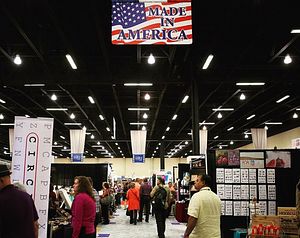The idea that the U.S.-China trade war could be seen in microcosm in the Smoky Mountains of eastern Tennessee may seem at first far-fetched. But here in Sevierville, the gateway to the renowned resort town of Gatlinburg, and the hometown of the iconic Dolly Parton, evidence of a sea-change in American buying habits and attitudes is everywhere.
This region, while historically poor – Dolly Parton relates that the two-room cabin in which she grew up with 11 other siblings had no running water or electricity – holds three sizable trade shows each year in early November. Buyers come from all over the United States and beyond to source everything from keyrings to costume jewelry, cell phone purses to silky scarves, and handmade vases to vape accessories.
Chinese vendors always make a good showing at these events, particularly in jewelry, from the ultra-cheap to the over-priced. Many set up row upon row of cash and carry displays filled with the best and the worst of these products, which come mainly from eastern and southern China.
On the first days of trade shows like this, buyers representing every segment – from mom-and-pop enterprises to museums, hospital gift shops to hotels, casinos to campgrounds – normally queue up to be first through the doors. They head to the Chinese owned-and-operated booths and quickly fill baskets, bags, and backpacks with as much as they can stuff in.
The aisles are packed at these vendors by 9:05 a.m. at shows that open at 9:00 a.m. Jewelry and accessories are stripped from the shelves as fast as the Chinese team can reload them with fresh merchandise.
That didn’t happen this year in Sevierville, Tennessee.
This year, the Chinese vendors’ booths were all but empty. The occasional shopper wandered in, picked up a basket, filled it with a few low-cost items, paid, and left.
Then she headed to the “Made in America” section. And there, she opened her wallet.
“Made in America” represented a large and diverse group of vendors selling everything from customized postcards to humorous license plates, all made in the United States, most by small, family-owned businesses.
For four days, the Chinese vendors, with jewelry and accessories covering 1,500 square feet of space, representing a rental investment worth well over $30,000, sat and stared at their phones for most of the day, while over in “Made in America” vendors of jewelry more expensive than the Chinese products wrote order after order.
It is easy to forget that the U.S -China trade war has an important corollary message attached to it for the American side of the equation: “Buy American.” The old phrase, which first came into mainstream use in 1933 under then-President Herbert Hoover’s “Buy American Act,” is part of a message embodied in the April 18, 2017 Presidential Executive Order on Buy American and Hire American.
But the 2017 act applies only to purchases made by the executive branch of the federal government. It, of course, does not and cannot regulate the private purchasing decisions of the ordinary American company or consumer.
But the spirit of the Buy American Act appears to be motivating many buyers in the United States today, as so starkly played out in the Smoky Mountains over the past week.
To be sure, buyers at the wholesale, retail, and consumer levels in the United States are beginning to see rising costs, as a result of the tariffs, on some goods coming into the country from China, and the resulting increase in price may certainly act as a deterrent to purchase.
But anecdotal evidence suggests that price alone is not necessarily the key factor for American buyers at any position along the supply chain.
For many American buyers, country of origin is supremely important. For those buyers, the country they want to buy from is the United States.
Although the Sevierville show and its cousins in Pigeon Forge and Gatlinburg draw a large and geographically diverse attendance, many of the buyers come from the economically-challenged regions of the Smoky Mountains of eastern Tennessee and western North Carolina, where incomes are up to 30 percent lower than the American average. Many buyers, when making investment decisions for goods to buy and resell in their regionally based businesses, do not want to purchase products that cost over $5. They will then sell those products for $10 to $15 at most.
Chinese products fit that bill, and have for years.
But Sevier County, Tennessee is Trump country. On November 6, voters in Sevier County returned their ballots for Republican Party candidates in dramatic numbers. Marsha Blackburn, the successful Republican candidate in Tennessee for the U.S. Senate, and a close ally of President Donald Trump’s, took 71.5 percent of the county’s vote. Trump had rallied for her election in Tennessee in the days leading up to the election.
This week, the people of Sevier County and its surroundings not only literally voted for Republicans aligned with the Trump agenda — they voted with their pocketbooks, too. They took his “Buy American” message to heart and paid a little more in support of what they believe is a vital and patriotic mission.
The Chinese group that came to Sevierville said they would not be back. That may have been the message they were supposed to receive.
































